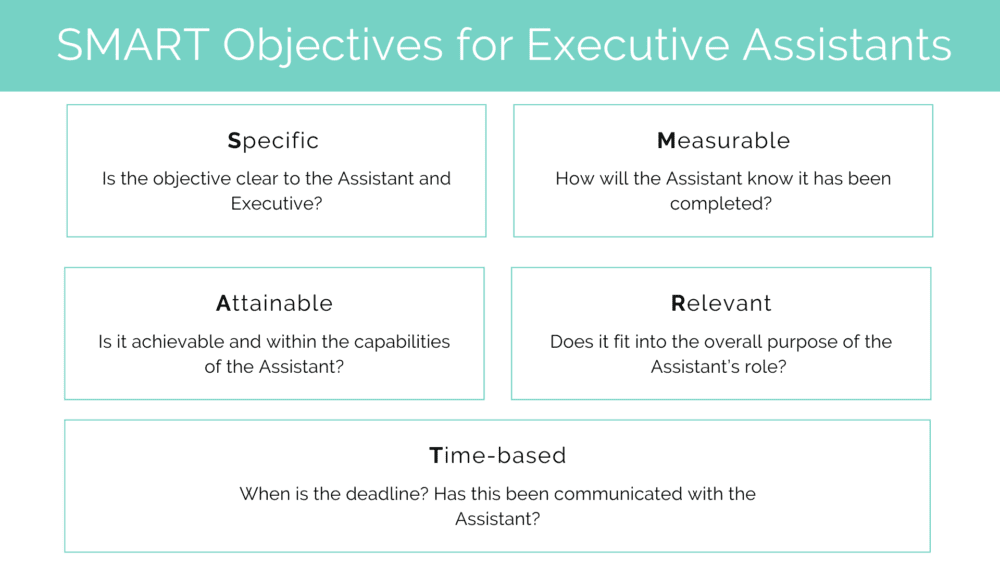SMART objectives for Executive Assistants
Setting SMART objectives for Executive Assistants are crucial because, without them, Assistants can be at such a disadvantage.
They can be taken for granted, mismanaged, and left without a clue as to what is expected of them in the role.
If an Executive takes little time to help their Assistant set reasonable objectives, how do they know what to judge the Assistant on? How can they evaluate their Assistant and set a career development plan?
It isn’t easy without setting objectives.
Assistants should proactively approach their objectives to ensure they have a series of pointers leading to a fantastic performance review. So with all that being said, career development objectives for Assistants are crucial.
Setting goals and SMART objectives does go beyond performance reviews, though. It is critical to your success as an Assistant.
Without clear objectives for the year ahead, it isn’t straightforward for Assistants to scope their roles.
The Assistant role is continuously changing.
Assistants are being asked to do much more work than ever.
Assistants have to be a sounding board for their Executives. They have to understand all of the administrative systems across the business. They must be savvy with all forms of technology, and of course, their emotional intelligence must be second to none.
The Personal and Executive Assistant role has expanded beyond arranging diaries and booking travel.
Of course, you all know this.
But, without a coherent list of objectives for the year ahead, Assistants will struggle to measure their success against the ever-expanding workload and tasks Assistants are expected to tackle.
Goal setting is essential for Assistants and something they must do every year to succeed.
So, where do Assistants start? How do you set SMART objectives for your Personal or Executive Assistant role?
That is probably why you are here.
Over the years, we have written much about performance reviews and setting goals and objectives for Assistants.
We know it is common for Assistants to leave their goal-setting right to the last minute. You are busy organising everyone else and ensuring your Executive is set for the year ahead.
It can be hard to find the time to sit down with your Executive to discuss your goals and objectives, and of course, the problem we hear the most is what goals and objectives you should set for your Assistant role.
The job is demanding and fast-paced, and Assistants have to deal with many changes to work plans.
One day an Assistant is working on a project, only to find out the entire project has been scrapped the next day. In this environment, it is understandable that Assistants will find it hard to plan their goals and objectives for the year ahead.
The other issue is that although Assistants work on complex tasks and projects, they also have many tasks expected to happen – diary management, travel booking, email management, and admin.
These tasks are hard to set objectives against and measure in terms of success and performance.
Executives will know when these tasks go wrong, but if an Assistant is fantastic at their role, these tasks happen without the Executive giving them a second thought.
But, we will repeat it.
Goal and objective setting is critical to developing into a top-level Executive Assistant. We have many resources to share for Personal and Executive Assistants who want to set SMART objectives and create achievable goals for their career.
We are going to cover the following:
One: Setting objectives for Assistants – best practice guidance
We will look at the difference between goals and objectives and how Assistants can set both for their year ahead. We will look at how Assistants can make sure they create goals and objectives they can stick to, and we will cover some tips and tricks that will help Assistants align their objectives with their Executives.
Two: What are SMART objectives?
Learn what SMART objectives are and how to create a great list of measurable objectives for Personal and Executive Assistants to elevate your career and keep you on track for the year ahead.
Three: Examples of SMART objectives for Assistants
Knowing the challenges Assistants have when planning their objectives for the year, we will provide a list of brilliant objectives and goals that Assistants can apply to their roles.
Setting objectives for Assistants – best practice guidance
Setting goals and objectives throughout the year is crucial for an Assistant’s career and personal development.
Working towards something and seeing the value you have added to your organisation should increase your confidence and give you a reason to expect and ask for salary increases and bonuses yearly. How should you set goals for your Executive or Personal Assistant career that you can stick with?
The first point that is worth making is that there is a difference between goals and objectives. Often we use the same language to describe how we want the year ahead to play out, but there is a difference between goals and objectives:
A goal is a clear, single-minded statement of an outcome – an ambition – to be reached within a specific timeframe. For instance, “We will redesign the company’s website, so it’s more user-friendly, by the end of next quarter.”
An objective is an action you’ll need to take to achieve that goal.
To redesign a website, you may need to redistribute some marketing spend towards your digital capabilities, find the right web designer, or do some User Experience research to truly define what “more user-friendly” means in that context.
Both goals and objectives are essential for Assistants to consider when planning their career development and the year ahead.
Goals will help Assistants succeed in the role, and objectives are the stepping stones to help you achieve your goals and stick to them in the long term.
Now that we have defined the difference between goals and objectives, let’s concentrate on setting goals that Assistants can progress throughout the year.
Here are four strategies Assistants can implement to help with goal-setting:
1. Find out the why behind your goals – what is the context?
When working with your Executive on your goals for next year, ensure you completely understand why they are essential to you, your Executive and the broader organisation.
What is the context?
How do your goals, and achieving them, make your Executive more successful and add value to the bottom line?
If the goals are personal to your growth, understanding the why and articulating your reasons behind the goals you set will make it much easier to achieve.
So often, Assistants have work that we feel we should be doing. So pick goals that motivate you and play to your values.
2. Break your goals down into action points and objectives.
Big life goals can seem impossible when viewed as a whole, so you have to break your goals down into action points that you can tick off as the year pans out. It is unbelievably rewarding to see what you have achieved to date.
Reward yourself when you tick off one of the tasks that take you further to your goal because it will motivate you to complete the next task and the next task until you achieve your final aim.
When listing the tasks that make up your goals, write them down and set deadlines for a place to look and a schedule to follow.
3. Get some accountability.
When you set goals that you want to achieve, you need to hold yourself accountable.
This is easier in a business setting because you have an Executive to report to who wants to know how you achieve your goals.
Your salary increase and bonuses depend on achieving your goals, so it is easier in one sense.
But, if you have personal career goals you want to achieve, for example, increasing your confidence, asking for a pay rise, attending a conference or going for a promotion, these goals are harder to accomplish. You will need to take some accountability.
The good news is you can outsource accountability!
Ask a colleague, friend or family member to check in on your progress, give you pep talks and push you when you are not feeling motivated. Get an accountability buddy!
4. Plan out time for your goals.
Assistants are always so busy helping others achieve their goals that we often forget to plan our time!
For Assistants, this is important.
You’ve got to try and carve out some time in your schedule to dedicate to your career and personal development.
If you have a demanding schedule, this can be tricky, and it comes down to communication and setting expectations.
Communicate your goals with your Executive, state how important they are to you and how you want to achieve them and let your Executive be part of the process.
They should support you if they know that you want to grow in the role.
Aligning your objectives with your Executive’s objectives
We are often asked, ‘what should I write for my Executive Assistant objectives?’ We always say the first place to start is to look at your Executive’s objectives.
Why?
For Executive and Personal Assistants, you must know your Executive’s goals and objectives. There are several reasons this is important: here are just a few:
Understanding what motivates your Executive is a crucial aspect of the Assistant role. If you know what drives them to succeed, you can support them in achieving their goals.
Your objectives should be aligned with their objectives. So example, if they have a strategic goal, something like ‘increase awareness of brand X, you should have a practical objective, something like ‘organise a launch party for brand x.’
If you know the areas your manager will focus on for the rest of this year, you can prioritise your workload so that tasks relating to these areas are completed first. Your manager will thank you for this one.
You can also prioritise meetings, tasks and emails relating to these critical areas. Again if you know what is essential to your Executive, you can use this information to add value to your role.
How to ensure Assistants meet their objectives.
Focusing on your Assistant career is one of the most important things you can do, and let’s face it, if you don’t take control of planning your Assistant career, then no one will!
In these great sessions, we focus on the role of a growth plan to map out your Executive Assistant or Personal Assistant career plan.
We heard from Hallie Warner, Chief of Staff at Adam Hergenrother Companies, a Chief of Staff who has progressed from EA to become a leading business strategist.
What are SMART objectives?

Assistants need to set objectives to take their careers forward and clarify what is expected of them in the role. How can Assistants ensure that their objectives are relevant to the role? Objectives must be SMART. Here is a definition of what that means, specifically for Executive and Personal Assistants.
Specific: Is the objective clear? Does everyone know exactly what the objective means and what is expected of the assistant?
Measurable: When does the objective need to be achieved, and how will the assistant know it has been completed? How will the completion of the task be judged?
Attainable: Is it achievable and within the capabilities of the assistant? Are there sufficient resources available?
Relevant: Is it a sensible objective within the current business climate? Does it fit into the overall purpose of the assistant’s role?
Time-based: When is the deadline? Are there review points throughout the objective? Can the objective be achieved straightaway (should it be in the yearly objectives)?
We have looked at how Assistants can create SMART objectives that are specific to the Assistant role, measurable, and attainable for the assistant’s level (goals should be different for Personal Assistants, Executive Assistants, C-suite executives, and Administrative Support Assistants).
The objective must be relevant to the Assistant’s industry and, finally, time-based so that Assistants can meet the deadlines and milestones set around it. We have also discussed how Assistants can match their Executive’s objectives and, lastly, how to ensure Assistants set goals they can meet and exceed.
Creating SMART objectives for Executive Assistants can be challenging, but it is not impossible. Let’s look at examples of goals and objectives that Assistants can use to elevate their careers and get the reward and recognition they deserve.
We are going to break these examples down into four areas:
- Business-related objectives for Executive and Personal Assistants
- Skills-related goals for Executive and Personal Assistants
- Task-related objectives for Executive and Personal Assistants
- Personal objectives for Executive and Personal Assistants
Business-related objectives for Executive and Personal Assistants
Assistants have a unique position in the organisation they work in because they have an overview of many different elements of the business and, therefore, can add value strategically and practically. This should be your starting point when thinking about any business-related objectives.
Look at the processes and procedures used in the business; what works and doesn’t work?
Can you make changes that will make the process more efficient or provide a better user experience? Identifying these improvements is one thing, but the value is making the improvements happen.
This is where your objectives play a part. Don’t just suggest an improvement – add it to your goals so that the improvement is made. Here are a few processes and procedures that might need an update.
- Business travel management and travel policies
- Procurement of new suppliers
- On-boarding new staff
- On-boarding new clients
- Managing IT equipment and stationery supplies
- Dealing with timesheets and billing
- Information security auditing and awareness
- Meeting room management and scheduling
Once you have identified an area that could be improved, how do you make that improvement into an objective? Here are two examples of a business-related objective for an Executive Assistant:
Work with other parts of the business (Marketing, Facilities, IT and HR) to create a more effective and detailed monthly monitoring system for supplier spending. To be completed for Q3.
Create a travel management policy for our department that includes particular policies for specific travellers, global hotel rates, top domestic and international flights, and maximum spending on expenses and subsidies. Work with department heads on sign-off and implementation. To be completed for Q2.
Skills-related objectives for Executive and Personal Assistants
The skill set for Assistants is vast.
You are asked to work on various tasks; it is incredibly essential that you keep your skills up to date and on point.
Assistants need to add skills related to their objectives — every year.
If you are unsure which skills to focus on, firstly, we have compiled an in-depth list of hard skills that will help you think about the skills you have and want to improve going forward. You can download the list of critical skills for Assistants here.
Adding a skills-related objective to your goals for the year is always beneficial. This objective will help you justify attending training and conferences for Assistants. If you can find a course that includes the skill you need to improve, you will find it easier to detail the business case for attending.
Here is an example of a skills-related objective for an Executive Assistant:
Maintain advanced knowledge of all Microsoft packages, including Outlook, Excel, Word, PowerPoint and OneNote. Take time each quarter to research best practices and update skills accordingly. To be completed by Q4.
Task-related objectives for Executive and Personal Assistants
There are so many tasks that Assistants can choose when they are deciding on their objectives for the year. There are so many tasks that Assistants are asked to complete.
When thinking about your objectives, it is worth adding some goals that can stretch you and develop you personally and professionally.
Think of the tasks you would like to be involved in and add an objective. They must be relevant to your business but add something that excites and motivates you.
Here are two examples of a task-related objective for an Executive Assistant:
Review team-building activities for the department, including remote workers. Create a schedule for the rest of the year, including the Summer and Christmas parties. Develop new team-building ideas (one per quarter) to help develop team well-being. To be completed by the end of Q1.
Streamline the Executive’s schedule so that the Executive has time for strategy and reflection throughout the day. Ensure that meeting requests have agendas and supporting documents and that the Executive has time planned out to read the paperwork needed for each meeting. Create a streamlining process and present it to the Executive by the end of Q1. To be finalised and running by Q2.
Personal objectives for Executive and Personal Assistants
Adding a personal development objective shows that you are invested in yourself and take your growth seriously.
Successful Assistants never stop learning and growing.
Here are two examples of a personal objective for an Executive Assistant:
To complete a training course on assertiveness to learn to push back on administrative work from my departmental colleagues and focus on project work for the department Director coming up in Q3. To be completed by Q2.
Read four business management books and share my new knowledge with the team. To be completed each Quarter.
What next?
Before you write your awesome SMART objectives for your Personal or Executive Assistant role, remember to download our FREE templates and guides for setting your SMART objectives.
Setting your Assistant objectives for the year is part of a much bigger picture, which is your yearly appraisal. We have a fantastic article on how to make sure you get the most out of your Assistant performance review.




